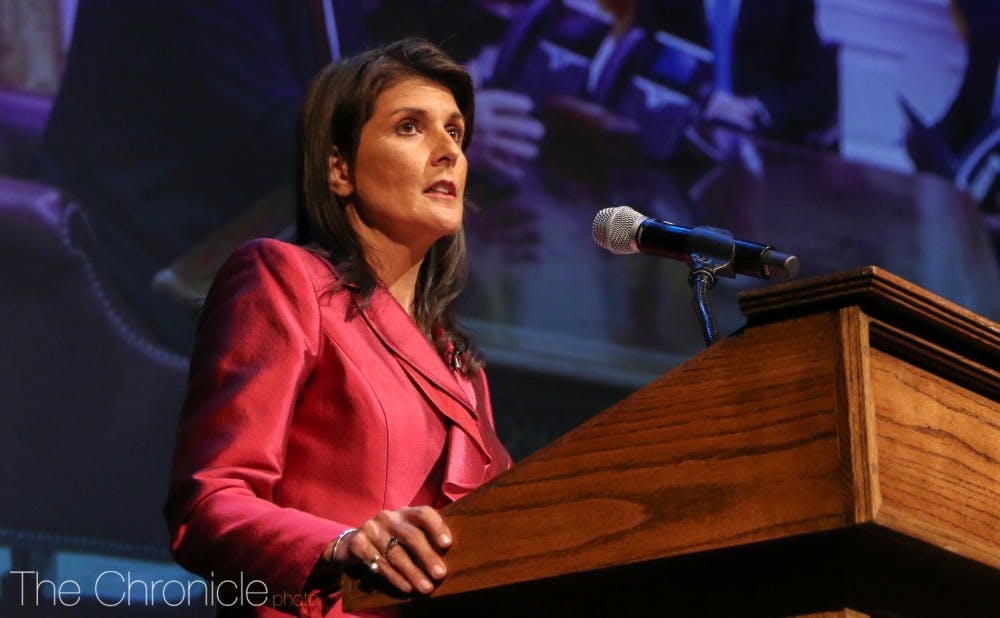Nikki Haley, the U.S. ambassador to the United Nations, walked across the stage Thursday to a standing ovation from a sold-out audience.
“As some of you might know, I’m a Clemson girl,” Haley said. “We’ve enjoyed our relationship [with Duke] on the football field—not so much on the basketball court though.”
During the lecture—entitled “Confronting Today’s Global Governance Challenges”—Haley discussed issues such as the proposed American Embassy in Jerusalem and U.S. relations with Russia, including the response to the nerve agent attack in the United Kingdom. The event was presented jointly by the Program in American Grand Strategy and the Sanford School of Public Policy.
Keeping with the title, former South Carolina Gov. Haley’s lighthearted introduction quickly changed tone as she switched to talking about the international threats to American security.
“The biggest difference between being governor and being ambassador is the nature of the opposition,” she said.
She explained that, though she and her political colleagues battled over tax laws and social policies, the arguments were in the interest of the South Carolinian constituents.
“But in the United Nations, I’m butting heads on nearly a daily basis with people who represent actual tyrants,” Haley said. “I sit across the negotiating table from representatives of regimes that commit genocide and governments that starve their own people.”
Haley pointed to Russia as an example of these “bad actors." To prove her point, she listed Russian actions opposed by the current U.S. administration—the 2014 annexation of Crimea, the support for Syrian President Bashar al-Assad’s regime and, most recently, the March nerve agent attack on a former Russian double agent living in Britain.
“Who’s to say Russia doesn’t do this again?” Haley asked. “But next time, maybe it’ll be in New York or Washington, D.C. or Durham, North Carolina.”
In retaliation for the poisoning, whose involvement Moscow has denied, the United Kingdom expelled 23 Russian diplomats from the country. Later, allies in NATO and the European Union followed with more than 130 such expulsions, including 60 from the United States. Haley pointed to this response as an example of American leadership on the world stage.
“United States leadership doesn’t have to involve military action,” Haley said. “Our most effective leadership is when we lead by example—when we embrace the fact that we are a special nation with a special message to the world.”
Haley took a similarly strong stance on Israel, specifically in defending Trump’s controversial decision last year to move the American Embassy to Jerusalem, which is claimed by both Israel and Palestine.
“The amount and the tenor of [the U.N.’s] anti-Israel bias is shocking,” she said. “Israel is our great friend.”
Haley touched on the Trump administration's efforts to shift the focus of the U.N. Security Council's monthly debates on the Middle East away from Israel toward other subjects like Iran and Assad.
“We made these changes to have the back of our friend and ally, Israel, absolutely. But we’re also sending a message that the era of the United States leading from behind is over,” Haley said. “It’s a new day for the United States and the world. We will not hesitate to protect our interests—defending our allies and standing up for our values.”
But Haley argued that the recognition of Jerusalem as Israel’s capital did not change the holy city’s international status. She assured the audience that the decision over the city’s borders was still left to the two rival countries.
When asked by event moderator Peter Feaver, professor of political science and public policy, whether she and her colleagues were being censored by the Trump administration, Haley strongly denied such notions.
“I can honestly tell you, no one is being muzzled in this administration,” Haley said, and the audience arose in laughter in response. “I’ve never been muzzled. No one on the [National] Security Council gets muzzled.”
She insisted that her views and actions in the United Nations were backed by the administration.
“The administration is completely supportive of everything that I say because they don’t tell me to stop,” Haley said.
Jason Grill, a first-year who attended the event, said he thought Haley was very knowledgable of foreign affairs. She had some good ideas, especially given her previous post as a state-level official, Grill noted.
First-year Rahul Krishnaswamy, a student in Feaver’s class, was also among those at the lecture.
“She’s a very interesting person,” he said. “She does a good job of balancing both sides politically. I can definitely see her as a future presidential candidate.”
Get The Chronicle straight to your inbox
Signup for our weekly newsletter. Cancel at any time.

